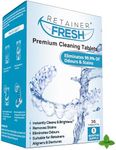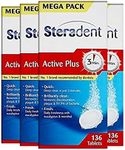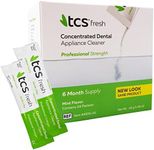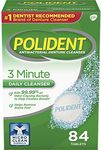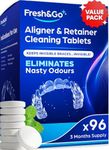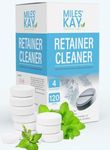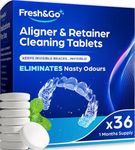Buying Guide for the Best Denture Cleaners
Choosing the right denture cleaner is essential for maintaining the hygiene and longevity of your dentures. Denture cleaners help remove stains, bacteria, and plaque, ensuring your dentures remain fresh and comfortable to wear. When selecting a denture cleaner, consider your specific needs, such as the type of dentures you have, any allergies or sensitivities, and your daily routine. Understanding the key specifications of denture cleaners will help you make an informed decision that best suits your lifestyle and dental health requirements.Type of CleanerDenture cleaners come in various forms, including tablets, powders, creams, and ultrasonic cleaners. Tablets and powders are typically dissolved in water to create a cleaning solution, while creams are applied directly to the dentures. Ultrasonic cleaners use sound waves to remove debris. The type of cleaner you choose depends on your preference and convenience. Tablets and powders are easy to use and effective for daily cleaning, while creams can be more hands-on. Ultrasonic cleaners are ideal for those who prefer a more thorough cleaning process without manual scrubbing.
Cleaning IngredientsThe ingredients in denture cleaners are crucial as they determine the effectiveness and safety of the product. Common ingredients include sodium bicarbonate, citric acid, and enzymes, which help break down stains and bacteria. Some cleaners may contain bleach or other harsh chemicals, which can be effective but may also cause irritation for sensitive users. If you have sensitive gums or allergies, look for hypoallergenic or natural ingredient options. Always ensure the cleaner is safe for your specific type of denture material.
Cleaning TimeThe time it takes for a denture cleaner to work can vary. Some products offer quick cleaning in as little as 3-5 minutes, while others may require soaking overnight. Quick-cleaning options are convenient for those with busy schedules, allowing for a fast refresh of your dentures. Overnight cleaners are suitable for a more thorough clean, especially if your dentures accumulate significant plaque or stains. Consider your daily routine and how much time you can dedicate to cleaning when choosing a product.
Effectiveness on Stains and OdorsThe ability of a denture cleaner to remove stains and odors is a key factor in its effectiveness. Some cleaners are specifically formulated to tackle tough stains from coffee, tea, or tobacco, while others focus on eliminating odors caused by bacteria. If you frequently consume staining foods or beverages, or if you smoke, look for a cleaner with strong stain-removing properties. For those concerned about bad breath, prioritize a cleaner that effectively neutralizes odors.
Compatibility with Denture MaterialNot all denture cleaners are suitable for every type of denture material. Some cleaners may be too abrasive for soft liners or certain types of plastic. It's important to choose a cleaner that is compatible with your specific denture material to avoid damage. Check the product label or consult with your dentist to ensure the cleaner is safe for your dentures. This consideration will help maintain the integrity and appearance of your dentures over time.
